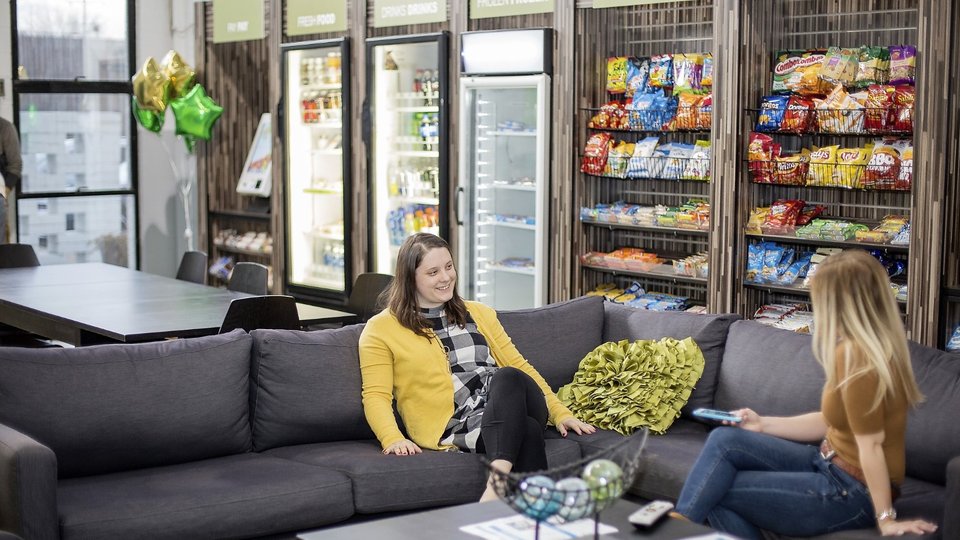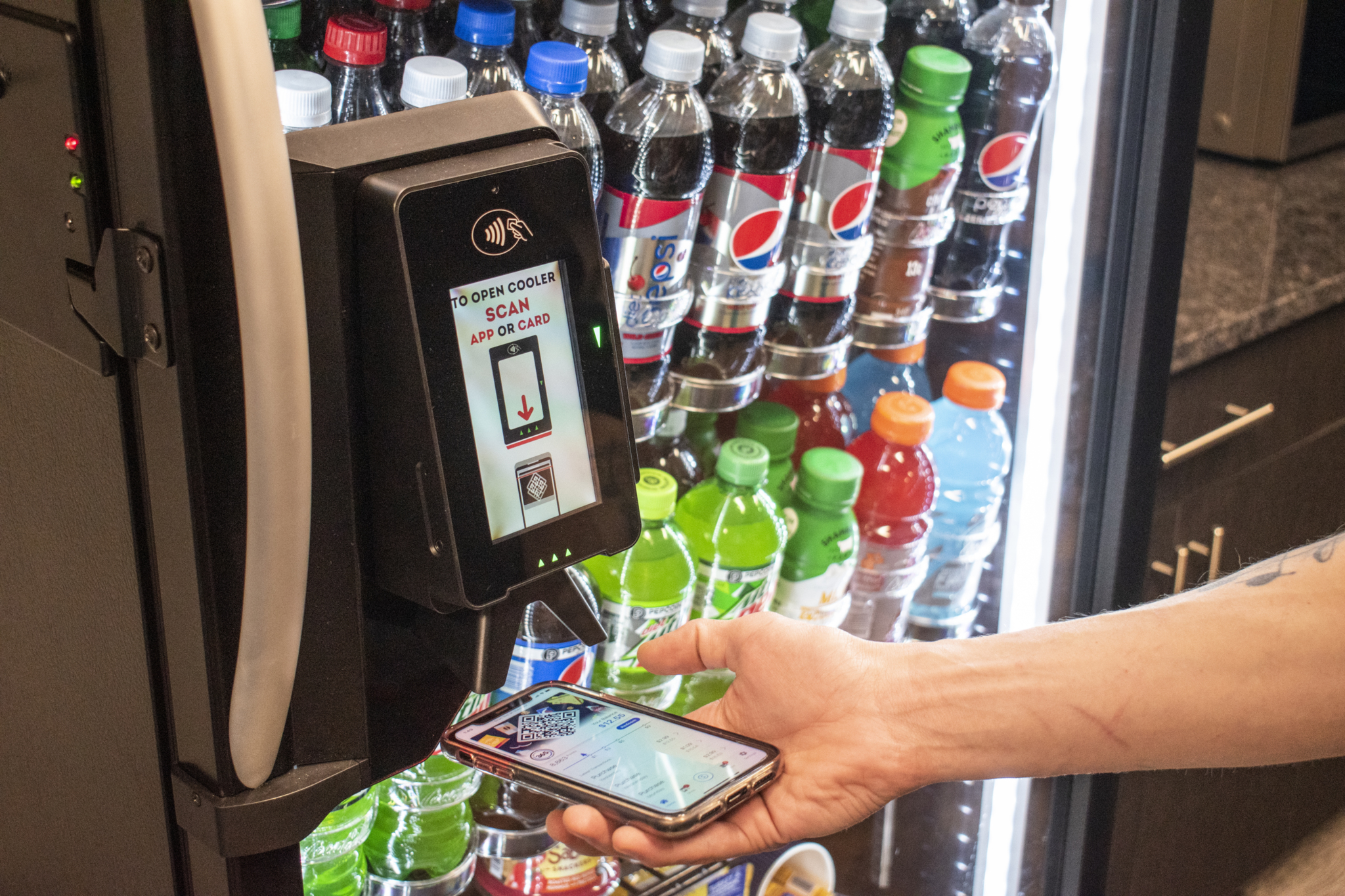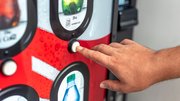Micro Markets
Micro markets, technology put Massachusetts operation in recovery mode
Norwood, Massachusetts based Foley Foodservice has recovered to around 80% of its pre-COVID sales, doubling its business since the low-point of the pandemic.

October 6, 2021 by Elliot Maras — Editor, Kiosk Marketplace & Vending Times
COVID-19 has forced many convenience services businesses into a recovery mode, but companies that have expanded into micro markets and other technology are finding their footing and are on the road to recovery.
Norwood, Massachusetts based Foley Foodservice has recovered to around 80% of its pre-COVID sales, doubling its business since the low-point of the pandemic.
After laying off close to half of the staff last year, the company has been in a recovery mode and now has 86 employees compared to 112 pre-COVID and operates 24 of its 36 pre-COVID routes.
The company's ongoing investment in technology has played an important role in both its growth and its ability to recover from the pandemic.
 |
| Steve Foley |
A software pioneer
In the early 1990s, Foley Foodservice invested in a DOS-based vending management system that allowed it to track sales at the machine and warehouse level. Around the same time, another software company emerged in nearby, Streamware Corp.
Streamware offered Windows-based software with DEX handhelds, which allowed vending operators to track cash meter readings and item level sales.
"As they've evolved, we've evolved with them," Steve Foley, company president, told Vending Times in a phone interview. Streamware was eventually acquired by Crane Merchandising Systems.
DEX data also helped the company pre-kit its deliveries, which made its routes more efficient and proved helpful when the company became one of the first in the nation to expand into micro markets in the mid-2000s.
Micro markets comprised nearly a quarter of the business pre-COVID, and have continued to expand. The company operated 150 micro markets at the time of this report, accounting for 29% of the total business.
The company operates Avanti Markets, 365 Retail Markets and Vendors Exchange markets, all managed using Crane Vendmax software.
The thumbprint payment has proven successful with micro markets.
"People love to just be able to go up and scan their thumb," he said.
Foley was also quick to introduce Simplifi software platform, which Crane Merchandising Systems introduced in 2018. The cloud platform allows drivers to access the Crane Streamware Vendmax data from their mobile devices rather than using handheld computers.
The journey continues
Foley continues to keep an eye on new technology.
He was immediately interested in the PicoCooler, a technology from 365 Retail Markets that has an interactive touchscreen, connectivity and payment versatility, and offers security with its built-in camera.
 |
| The PicoCooler from 365 Retail Markets allow Foley Foodservice to deploy a micro market in locations with smaller populations than traditional micro markets. Photo courtesy of 365 Retail Markets. |
He was impressed by the machine's security; a customer has to open the machine with their credit card.
The PicoCoolers allow the company to service locations with smaller populations than the larger micro markets. Where Foley normally looks to do $20,000 in annual sales from a micro market, a location with a PicoCooler can be profitable doing around $15,000.
Foley has also used the retrofit machine doors from Vendors Exchange International Inc. which have enabled the company to use machines that did not come with these new capabilities rather than having to invest in newer machines.
The retrofit doors offer VEI's universal controller board that supports cashless payment, touchscreens, remote price changes and LED lighting for the cabinet interior.
The company has also introduced PayRange to about three quarters of its vending machines, allowing customers to pay using their mobile phones.
"It definitely helped," Foley said regarding PayRange. Customers are able to use it without much difficulty once they begin using it.
Technology requires testing
Investing in technology is not as easy as it might sound, as it is necessary to test new products before making a major investment. Not all innovations have panned out for Foley.
He tested some of the digital signage screens shortly after they were introduced a few years ago. Foley realized he needed to ensure that the machines were stocked with the products being advertised on the digital screens. This proved challenging.
He has not explored touchless machines, which he doesn't believe will be in demand long term. Some customers asked about them during the pandemic, but none said they wanted them.
"The inquiries have gone away and we never had to buy any or install any," he said.
Like most veterans, Foley does not have any interest in the dedicated pizza vending machines have emerged in the last year.
"I just don't see them as being viable in the long run," he said.
Foley recognizes that education is an ongoing process for those who want to be successful. Being a Canteen franchisee has helped.
"It's comfortable to feel your part of something bigger," Foley said regarding being a Canteen franchisee. "They bring people in to teach you how to be better in business."
The company is continuing to recall employees that were let go during the pandemic.
He projects the year will end at 90% of his 2019 revenue, which would come in at between $22.5 million and $23 million.
For an update on how the coronavirus pandemic has affected convenience services, click here.
Photo: LinkedIn.
About Elliot Maras
Elliot Maras is the editor of Kiosk Marketplace and Vending Times. He brings three decades covering unattended retail and commercial foodservice.
 ChatGPT
ChatGPT Grok
Grok Perplexity
Perplexity Claude
Claude






